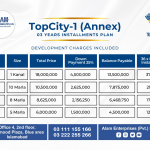
The Ultimate Mortgage Calculator Guide For Smarter Financial Decisions
- Buying a home is one of the most significant financial decisions most people will make. A mortgage calculator can be an invaluable tool. It helps prospective homeowners understand their financial commitments, plan budgets, and make smarter financial decisions. This guide will walk you through everything you need to know about using a mortgage calculator effectively.
-
What is a Mortgage Calculator?
- A mortgage calculator is an online tool that helps you estimate your monthly mortgage payments based on various factors such as the loan amount, interest rate, loan term, and down payment. It provides an easy way to understand how much you can afford to borrow and what your monthly repayments will look like.
- Key Inputs for a Mortgage Calculator
- To get accurate results from a mortgage calculator, you'll need to input the following details:
-
1. Loan Amount
- The loan amount is the total money you plan to borrow. This is typically the purchase price of the home minus your down payment.
-
2. Interest Rate
- The interest rate is the cost of borrowing money, expressed as a percentage. It can be fixed or variable, affecting your monthly payment differently.
-
3. Loan Term
- The loan term is the period you plan to repay the loan. Common terms are 15, 20, or 30 years. Longer terms generally mean lower monthly payments but more interest paid over the life of the loan.
-
4. Down Payment
- The down payment is the initial amount you pay upfront for your home. A larger down payment can reduce your loan amount and, consequently, your monthly payments and interest.
-
5. Property Taxes and Insurance
- Property taxes and homeowners insurance are additional costs associated with owning a home. These are often included in your monthly mortgage payment.
-
How to Use a Mortgage Calculator
- Step 1: Gather Your Financial Information
- Before using a mortgage calculator, gather all necessary information, including your desired loan amount, interest rate, loan term, and down payment amount.
- Step 2: Enter the Details
- Input the gathered information into the mortgage calculator. Most calculators have fields for each of these inputs.
- Step 3: Analyze the Results
- Once you've entered all the details, the calculator will provide an estimated monthly payment. It may also offer a breakdown of how much you'll pay in principal and interest over the life of the loan.
- Step 4: Adjust for Different Scenarios
- Experiment with different loan amounts, interest rates, and loan terms to see how changes affect your monthly payment. This can help you find the most affordable and financially sound option.
-
Benefits of Using a Mortgage Calculator
- 1. Budget Planning
- A mortgage calculator helps you understand what you can afford, allowing you to plan your budget effectively. It gives a clear picture of your monthly obligations and how they fit into your financial plan.
- 2. Financial Clarity
- By breaking down your mortgage payment into principal, interest, taxes, and insurance, a mortgage calculator provides financial clarity. This helps you understand where your money is going each month.
- 3. Decision Making
- With the ability to compare different loan scenarios, a mortgage calculator aids in making informed decisions. You can see the impact of different down payments, interest rates, and loan terms on your monthly payments and overall financial health.
- 4. Preparing for Additional Costs
- A good mortgage calculator also includes estimates for property taxes and insurance, helping you prepare for the full cost of homeownership, not just the loan repayment.

-
Tips for Using a Mortgage Calculator
- 1. Be Realistic
- Use realistic numbers when inputting data into the mortgage calculator. Overestimating your financial capabilities can lead to strain and potential financial trouble.
- 2. Consider Extra Payments
- Some calculators allow you to input extra monthly payments. This feature can show how additional payments can reduce your loan term and overall interest paid.
- 3. Account for Other Expenses
- Homeownership comes with other expenses, such as maintenance, utilities, and possible homeowner association fees. Factor these into your overall budget planning.
- 4. Use Multiple Calculators
- Different calculators may offer various features and insights. Use several calculators to get a comprehensive understanding of your mortgage options.
-
Conclusion
- A mortgage calculator is an essential tool for anyone considering buying a home. It offers a clear view of your potential financial commitments and helps you make smarter financial decisions. By understanding how different factors affect your mortgage, you can better prepare for the future and ensure that your dream home is a financially sound investment.
- Using a mortgage calculator effectively empowers you to take control of your home-buying process, giving you the confidence to make the right decisions for your financial situation. Start using a mortgage calculator today and take the first step toward your new home.
-
Frequently asked questions (FAQs)
- 1. What information do I need to use a mortgage calculator?
- Answer: To use a mortgage calculator, you typically need the following information:
- Loan amount: The total amount you plan to borrow.
- Interest rate: The percentage charged on the loan.
- Loan term: The period you will repay the loan (e.g., 15, 20, 30 years).
- Down payment: The upfront payment you make towards the purchase of the home.
- Property taxes and homeowners insurance: Additional costs are often included in your monthly payment.
- 2. How accurate are mortgage calculators?
- Answer: Mortgage calculators provide estimates based on the information you input. While they are quite accurate for giving a general idea of your monthly payments and total loan costs, they might not account for all variables such as changes in interest rates, property taxes, or insurance premiums. Always consult with a mortgage professional for the most accurate and personalized information.
- 3. Can a mortgage calculator help me decide how much home I can afford?
- Answer: Yes, a mortgage calculator can help you determine how much home you can afford by showing you how different loan amounts, interest rates, and loan terms will impact your monthly payments. This can help you align your home purchase with your budget and financial goals.
- 4. Do mortgage calculators account for extra payments?
- Answer: Many mortgage calculators have options to include extra payments. By inputting additional monthly or yearly, you can see how these extra payments can reduce your loan term and the total interest paid over the life of the loan. This feature can be useful for planning strategies to pay off your mortgage faster.
- 5. What are the benefits of using multiple mortgage calculators?
- Answer: Using multiple mortgage calculators can provide a broader perspective and a more comprehensive understanding of your mortgage options. Different calculators might offer various features and assumptions, so comparing results from several calculators can help ensure that you have considered all potential scenarios and made the most informed decision possible.






.webp)






